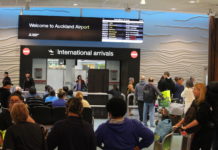By rnz.co.nz and is republished with permission
SkyCity casino has been shut down for five days for failing to help a problem gambler who lost more than a million dollars on the pokies, but the business’ boss will not say if they have paid any back.
SkyCity casino’s have been forced to close their doors this week, after they failed to intervene to meet their host responsibilities to help a problem gambler avoid losing more than $1 million. Photo: RNZ/Nick Monro
The shutdown began at midnight Sunday and runs until Friday night.
On one occasion the gambler spent up to 9 hours playing continuously.
On 23 occasions between 2017 and 2021 they played for five hours or more without a break and no casino staff intervened.
The five day gambling shut down is SkyCity’s punishment for failing to meet its harm minimisation and host responsibility obligations.
SkyCity chief executive Jason Walbridge would not answer Checkpoint’s repeated questions about how much of SkyCity’s profit was from problem gambling.
International research puts the figure at anywhere between 20 and 70 percent for overseas casinos.
“We’re absolutely not proud, at all, to be in this situation, and we’re sorry this occurred and we just simply did not get it right. We made mistakes and we’re rightfully being held accountable here,” Walbridge said.
“We don’t want anybody to lose $1 more than they can afford to. We’ve put in place significant programmes to help us assist and identify where people are having problems with gaming.”
SkyCity chief executive Jason Walbridge Photo: Supplied/ SkyCity
“We absolutely recognise that a very small percentage of our players have a problem with gambling. We are working hard every day to help them, and we put significant resources in place to date.”
Walbridge said he would not discuss whether any of the money lost by this anonymous problem gambler, who was failed by SkyCity’s host responsibility policies, had been paid back, or if any problem gamblers have had money paid back by the casino.
“We’re not able to talk specifically about our agreements that we’ve reached with this individual player, what I can tell you is we’ve absolutely apologised to [the person],” he said.
“For any customer that feels like they haven’t been treated appropriately, we welcome them to come forward and we will absolutely talk about how we can take care of them … every person’s situation is different, what we’re interested in is helping players identify if they have a problem, and to seek help.”
Despite the ongoing work by the casino, Walbridge said he could not name a figure for how many of the customers the casino serves are problem gamblers. He said work was ongoing to find ways to help staff identify problem gamblers.
The SkyCity casino in Auckland Photo: RNZ/Nick Monro
SkyCity’s host responsibility policy currently allows the casino to let people gamble for five continuous hours before staff intervene: “After five hours we approach players to see if they need some help or they would like to take a break,” Walbridge said.
Despite recommendations by experts on gambling addiction who say intervention should begin after no more than three continuous hours, when challenged about if the casino would consider lowering the five hour time limit to try to reduce harm, Walbridge said that limit was set by regulators The Department of Internal Affairs. However the casino does submit research to the department supporting its own stance about what the time limit should be, he said.
“Five hours is a long time, but our average player is on our floor for just over one hour, so we’re really not talking about the majority of players here…There’s absolutely no doubting that we failed in this case,” he said.
“Our systems and our people failed to identify and to talk to this player, and we are working very hard to put that right.”
Any time the casino operates, its host responsibility requirements mean it must have at least six ‘host responsibility executives’ covering the casino floor monitoring players and on the watch for problem gambling. Walbridge said the casino does meet their requirements, but could not give numbers for how many ‘host responsibility executives’ the casino does have at work each day.
“We’ve got individuals who are monitoring or supervising our staff every day, and after two months on the job I am committed to making sure that we’re absolutely doing the right things.”
Photo: RNZ / Cole Eastham-Farrelly
This case was being taken seriously by the organisation, and the shutdown was “an unprecedented event for us”, Walbridge said.
“We’ve got all of our employees together this week going through training to uplift our skills and capability on host responsibility, to change our culture and to talk about new technology that we’re going to implement to introduce 100 percent carded plays that will help us improve our capabilities next year.”
The shutdown period this week avoided weekend hours, the casino’s busiest time, and Walbridge was challenged about whether that was fair.
“We’re closing from midnight last night through to midnight Friday,” he said. “And that five day period was agreed with our regulators the Department of Internal Affairs,” he said.











